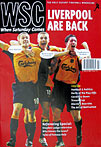 New Labour came to power in 1997 riding shamelessly on the football bandwagon. Steve Greenfield and Guy Osborn take a critical look at their record in office.
New Labour came to power in 1997 riding shamelessly on the football bandwagon. Steve Greenfield and Guy Osborn take a critical look at their record in office.
Even before the Labour victory in May 1997, football had a prime position in the political landscape. The Labour Party had launched its Charter for Football in 1995, detailing how they would respond to what Tony Blair called “the critical problems now associated with the game”. The rise of the Premiership and the the prospect of Euro 96 had helped make football socially acceptable and many clubs suddenly found themselves patronised, often literally, by the great and good (as well as some MPs).
On a very superficial level, football was seen as a way of connecting with the public and this was a useful tool for New Labour to assert their populist credentials. This was in stark contrast to the previous Tory governments, though John Major certainly appreciated the importance of sport to the national psyche.
Once in power, the creation of the Football Task Force was one of the first sporting steps of the new administration. Tellingly, its remit was somewhat different from that anticipated, with the proposal to consider restructuring the FA notable by its absence. While the appointment of Tony Banks as minister for sport was shocking to some, the news that David Mellor had been asked to chair the Task Force came as an even nastier surprise. Though it is easy to pick holes in the structure and ultimate effects of the Task Force, it should be acknowledged that this was the first time a government had attempted to deal generally with football since the Chester Report of 1968. All the other reports, such as Popplewell and Taylor, have been driven by disasters.
The Task Force produced four reports with many laudable recommendations – in particular the Supporters Direct initiative. Much was made of the split in ranks during the final report on commercial issues, but this was perhaps inevitable given the broad range of interests represented. But one of its key recommendations, the creation of an Independent Football Commission with wide ranging terms of reference, has yet to be realised. This was partly due to the government’s initial insistence on appointing its members rather than having a process of open application. Again though, the creation of such a body would have been unthinkable ten years ago and is certainly a step in the right direction.
While much of the above demonstrates New Labour’s attempts to engage with some key football issues, the government’s football-specific law and order legislative programme proved far less palatable. The Conservative governments had made much of the hooligan issue and acted to regulate fans in a heavy-handed fashion. New Labour has continued this process and even enacted provisions that might have surprised some backbench Tories had their own party proposed them.
Some changes were positive, such as the attempt to close one of the loopholes in the racist chanting provisions. More worrying was the passing of the Football Offences and Disorder Act 1999, swiftly followed by the Football Disorder Act 2000. Some of the changes they introduced were cosmetic, such as the renaming of exclusion orders, but others were breathtaking in their scope, including an ability to control passports. A banning order can now be imposed without proof of a criminal conviction but based on the “reasonable suspicion” of a police officer that the individual concerned has been connected to disorder. While this legislation can be seen as part of the government’s general approach to crime, it was prompted specifically by the perceived need to support the 2006 World Cup bid.
Overall, New Labour have adopted a somewhat contradictory attitude to football during their first term, too often driven by their eagerness to provide a populist appeal both to football fans and the law-and-order brigade. On the one hand they have shown fan-friendly credentials via the DTI response to BSkyB’s attempted takeover of Man Utd and their support for mutuality of ownership through Supporters Direct. On the other hand, the civil liberties of fans have been eroded by some extraordinarily rigorous provisions.
The dispute over the campaign to reintroduce safe standing indicates that at least football is subject to debate and discussion within the government. However, the suspicion persists that much of the New Labour response has been heavily symbolic. The role of the IFC, and the powers it is given when finally constituted, will be crucial in determining where New Labour really stands on football.
From WSC 173 July 2001. What was happening this month